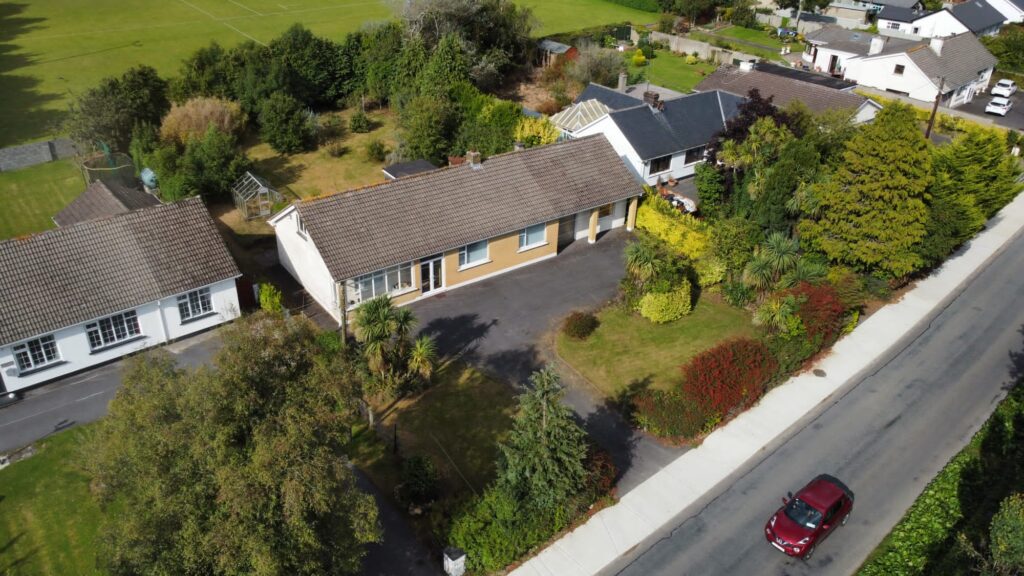‘Wexford auctioneers experience the plethora of benefits that come with online auctions’. Gorey Guardian. 22/02/23.

The words property auction will conjure up images of a crowded and perhaps, chaotic room with bids being shouted from every corner of the room in quick succession.
However, as auctions have largely shifted from offices and hotel function rooms to the virtual world, putting a property under the hammer looks dramatically different to how it once did.
The move to the online space was, like many things, influenced by Covid, explained Jack Quinn, Sales Negotiator with Quinn Property. However, considering the plethora of benefits that come with selling land and property via online auction, it’s certain that this mode of sale will continue and grow.
“Covid accelerated the shift online. I am sure in time, they would have got there eventually but that kind of pushed it over the edge,” he explained. “In 2023, people probably still have the idea of an auction in a packed room be it in our office or a bigger room in a local hotel. To be honest, that day, while not entirely gone, is something we are very much moving away from.”
To date, Quinn Property have held 60 online auctions. Through this experience, the team at Quinn Property have seen the number of advantages it brings to the client, the buyer and themselves, whether they’re selling a plot of land, a family home or a commercial building.
“One of the main advantages of the online auction is you need to register in advance. You don’t just show up on the day. In that traditional auction room setting, a lot of the attendees are there to observe rather than participate. This kind of flips that. Yes, other people can view as well but one of the key advantages is we have good visibility of who is there to bid on this auction before it happens. That gives us a good sense of how it might go on the day rather than go in completely blind,” he explained.
“In a traditional auction setting, if sellers are seeing people come in and wondering if they’re going to bid or not, it is probably a stressful enough environment. While selling any property may always have some unknowns and a bit of stress, I would like to think to some extent, this makes it a bit easier. We can communicate to them clearly how viewings are going.
“When it comes closer to the time of the auction, we can say we have a certain number of registered bidders. We can better manage client expectations by communicating more informed views on the level of interest and who the interest is coming from. You’ll never know the outcome for sure but you will have a much better idea than pre-Covid.”
Those who wish to register to attend the online auction must pay a deposit amounting to ten per cent of the property asking price during the registration process. This means that only serious bidders are likely to join, increasing certainty of sale.

“With private treaty, someone could view a property two or three times, eventually agree on the sale and then for whatever reason, decide not to go through with it. Then we’re back on the market with the property and it is never as easy that second time. The momentum is somewhat lost,” explained Jack. “With the online auction, you have certainty. We will already have taken a 10 per cent deposit from each person bidding and if a person makes the highest bid on auction day and then tries to get out of the sale afterwards, this deposit is non-refundable.”
Online auctions kind of flip the responsibility on its head. In a private treaty sale, you can agree the deal and do all your due diligence afterwards. This is the complete opposite. Before going to bid and perhaps being the highest bidder and completing the sale, it is your obligation to familiarise yourself with the contract and do all your due diligence if necessary on the house and on the contract. It is a friendlier environment for a seller because the obligation is put on the buyer from an early point.”
Another benefit of selling via online auction is efficiency, explained Jack. Whereas a traditional sale may drag on for several months, the set auction day means that everything from property viewing to the sale itself is done in a defined period of time.
“It is focused, it is condensed, it is efficient. Because it is time-sensitive, you are either in or you’re out.”
Moving property auctions online gives potential buyers living abroad the opportunity to participate. This is of benefit to the seller as it increases competition, while it also allows interested buyers overseas the chance to have full control over the bidding process.
“If we were doing a traditional auction, most of our auctions would be held in our office in Gorey if the property was in the Gorey area. If we were doing an auction of a property in north Wicklow or south Wexford, we would pick a venue close to there as in most cases, bidders are local. However, especially when it comes to auctions of farms and land, a lot of the bigger holdings are from 50 acres plus. You’re getting interest, not just from locals, but probably from across the country and even from abroad.
“Those people could arrange to have someone bid on their behalf in the traditional auction setting but this gives them control to bid from wherever. It is just more convenient. Even if they are based an hour or two away, they don’t have to travel to the auction room to bid.”
The online auction platform has allowed Quinn Property to attract more interest from overseas buyers, with property and land sold to people in the UK, America, Australia and elsewhere in recent months.
An online auction only requires a minimum of “two motivated bidders” to go ahead but the more bidders there are, the more it drives competition. However, when it comes to farm sales in which a property is being sold off in several lots, it is better to have a larger number of registered bidders, explained Jack.
For a client interested in selling via online auction, the preparation process is largely the same as it would be should they sell via private treaty.
“It is very similar from their point of view. They simply have to instruct their solicitor to have the contracts of sale done up and ready prior to the auction so people know exactly what they are buying,” explained Jack.
Those interested in bidding can register up until one day before the auction, but Quinn Property always advises people to register and view the property early so they are familiar with all of the terms of the sale before placing a bid.
“To register, you call or email ourselves. We would make sure you’re aware of the auction date and that you need 10 per cent deposit up front. If that works, you come and view the place like any other viewing. You’d ask and we’d answer questions. Based on the viewing, maybe a couple of days after when you have had time to consider things, you would call us to go through the registration process.
“You need to create an online account with our auction providers. With less tech-savvy people, we always recommend they do it ahead of time,” explained Jack. “Once they are registered, we’d send our bank details. You would transfer us 10 per cent of the guide price. The contracts would be ready before the auction so either you could look over them yourself and make sure you’re satisfied with the terms or, if you want to be really thorough, you could engage your solicitor.”
For customers who are not as comfortable with technology, the team at Quinn Property offer to run them through a demo auction before the real thing to make sure they’re aware of how everything works.
“It’s a big deal, it’s a lot of money and although people may know more about technology now, there may still be more traditional customers who need that extra helping hand before the real thing.”
On the day of the auction, registered bidders log in to an online auction platform. They will be brought to a live stream of the auction, which typically takes place at Quinn Property’s Carnew office. In addition to seeing the auctioneer and solicitor, bidders will see a panel on their screen which allows them to make bids and monitor the bids of others.
“Once the first bid is made, it will come up on the panel on the screen. It will be set to certain increments, maybe initially of €10,000 and then as it slows down, it could go to €5,000. But it will be clear before you bid what the increments are. There is another panel saying ‘you are the highest bidder’ or ‘you are not the highest bidder’. So it is very clear what is happening.”
If the highest bidder makes a bid above the initial asking price, they must be able to provide the additional money required to bring their deposit to ten per cent of the property sale price. Following the signing of contracts, which can be done in person or online, there is a defined closing period of four to six weeks. Those who did not offer the highest bid will be refunded the deposit they made earlier.
Quinn Property currently has a diverse range of properties due to be sold via online auction in the coming weeks, including residential, agricultural and commercial properties across a wide range of locations.

One of the next auctions will take place on Wednesday, March 15 when The Wedge, Clonattin will go under the hammer. This large four-bedroom detached residence sits adjacent to Gorey Rugby Club and Naomh Eanna GAA grounds and is within walking distance of Gorey Main Street.
Those interested in finding out more about upcoming online auctions can visit the Quinn Property website, where properties due be sold via online auction are clearly labelled with a red banner.
“Online auctions are new to a lot of people but we have had some great results. If we were to do business with these people again, based on how most of them have gone, I’m sure they would recommend it.”
This article was written by Amy Lewis and can be accessed here.
QUINN PROPERTY – Experts in the local property market